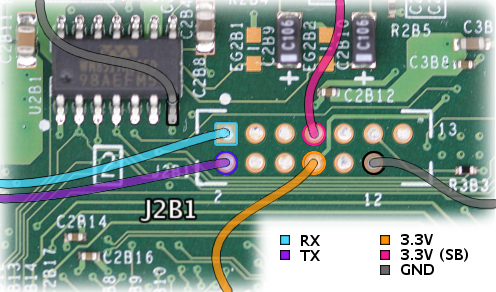UART: Difference between revisions
Jump to navigation
Jump to search
imported>Ge0rG m (linked openwrt wiki with cell phone cables) |
imported>Bertl m (→Serial Console) |
||
| Line 8: | Line 8: | ||
like the one from the [[Stereo DAC]] nearby the J2B1 header. | like the one from the [[Stereo DAC]] nearby the J2B1 header. | ||
Note that you will probably need a [[Level Shifter]] to connect the 3.3V RX/TX pins to your [[PC Serial Port]] (which usually uses +/-12V) | Note that you will probably need a [[Level Shifter]] to connect the 3.3V/1.8V RX/TX pins to your [[PC Serial Port]] (which usually uses +/-12V) | ||
The Level Shifter can be either powered from the standby 3.3V on pin 7 (always on) or better from the active 3.3V on pin 8 or from an external power source. | The Level Shifter can be either powered from the standby 3.3V/1.8V on pin 7 (always on) or better from the active 3.3V on pin 8 or from an external power source. | ||
It is also possible to use some cheap [http://wiki.openwrt.org/oldwiki/openwrtdocs/customizing/hardware/serial_console#cellphone.data.cables cell phone data cables] as a PC interface. | It is also possible to use some cheap [http://wiki.openwrt.org/oldwiki/openwrtdocs/customizing/hardware/serial_console#cellphone.data.cables cell phone data cables] as a PC interface. | ||
Revision as of 11:04, 20 September 2010
Serial Console
The Serial Console can be very useful when debugging the Linux Kernel or diagnosing the Boot Process.
You can either use the GND pin on the header (might be difficult to solder for the inexperienced) or some alternative GND pin like the one from the Stereo DAC nearby the J2B1 header.
Note that you will probably need a Level Shifter to connect the 3.3V/1.8V RX/TX pins to your PC Serial Port (which usually uses +/-12V)
The Level Shifter can be either powered from the standby 3.3V/1.8V on pin 7 (always on) or better from the active 3.3V on pin 8 or from an external power source.
It is also possible to use some cheap cell phone data cables as a PC interface.
